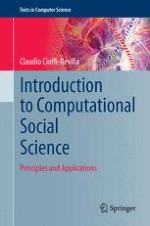2014 | OriginalPaper | Buchkapitel
3. Automated Information Extraction
verfasst von : Claudio Cioffi-Revilla
Erschienen in: Introduction to Computational Social Science
Verlag: Springer London
Aktivieren Sie unsere intelligente Suche, um passende Fachinhalte oder Patente zu finden.
Wählen Sie Textabschnitte aus um mit Künstlicher Intelligenz passenden Patente zu finden. powered by
Markieren Sie Textabschnitte, um KI-gestützt weitere passende Inhalte zu finden. powered by
